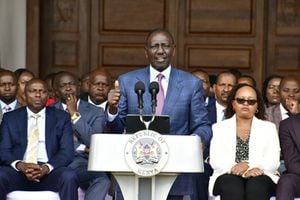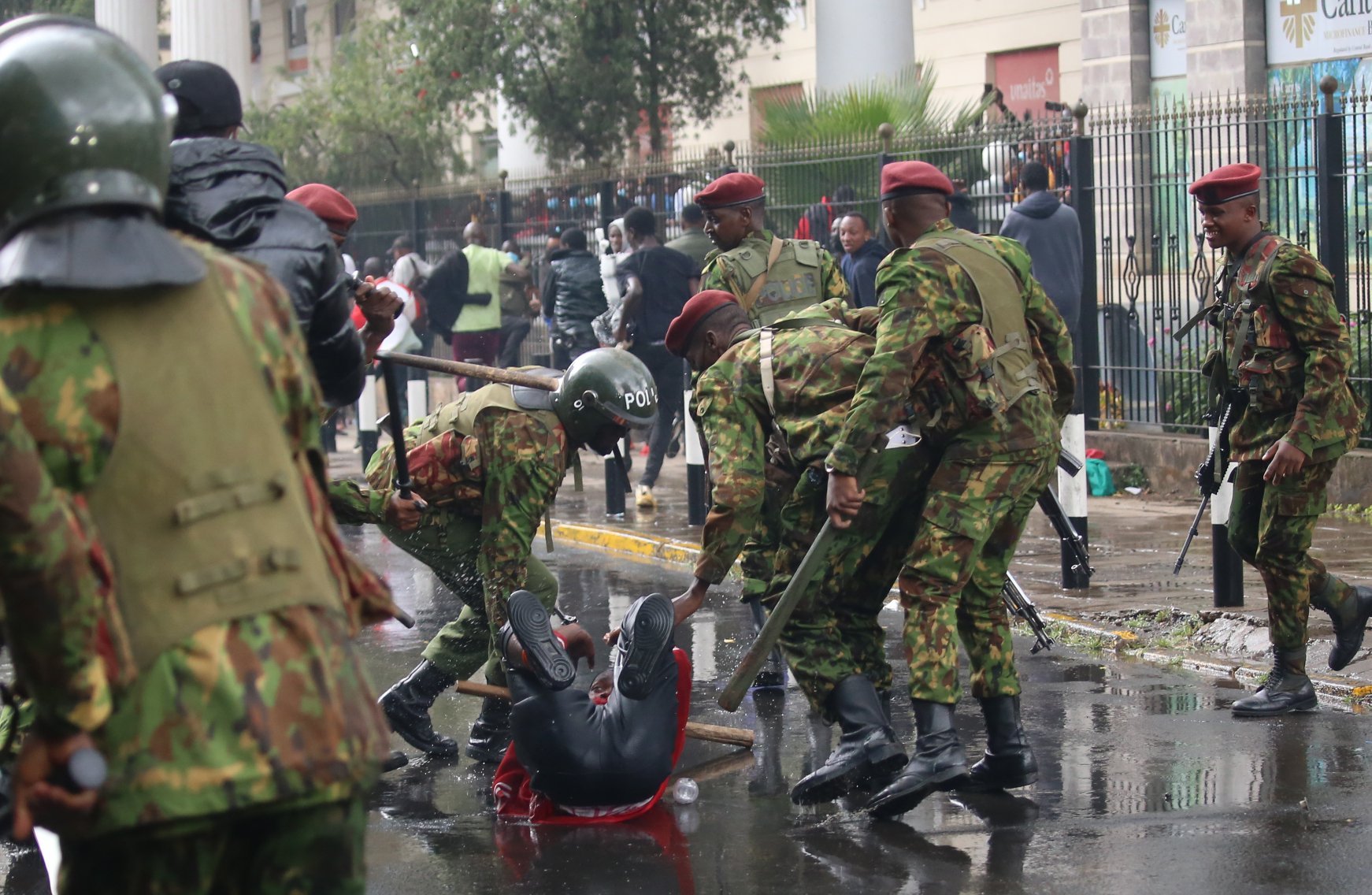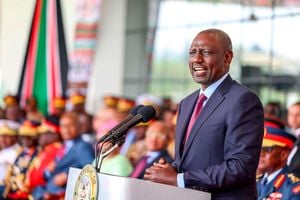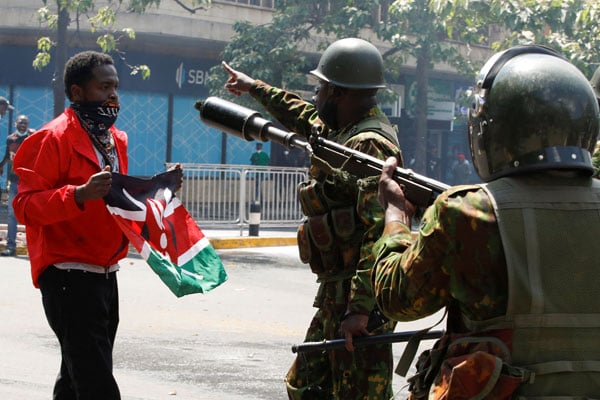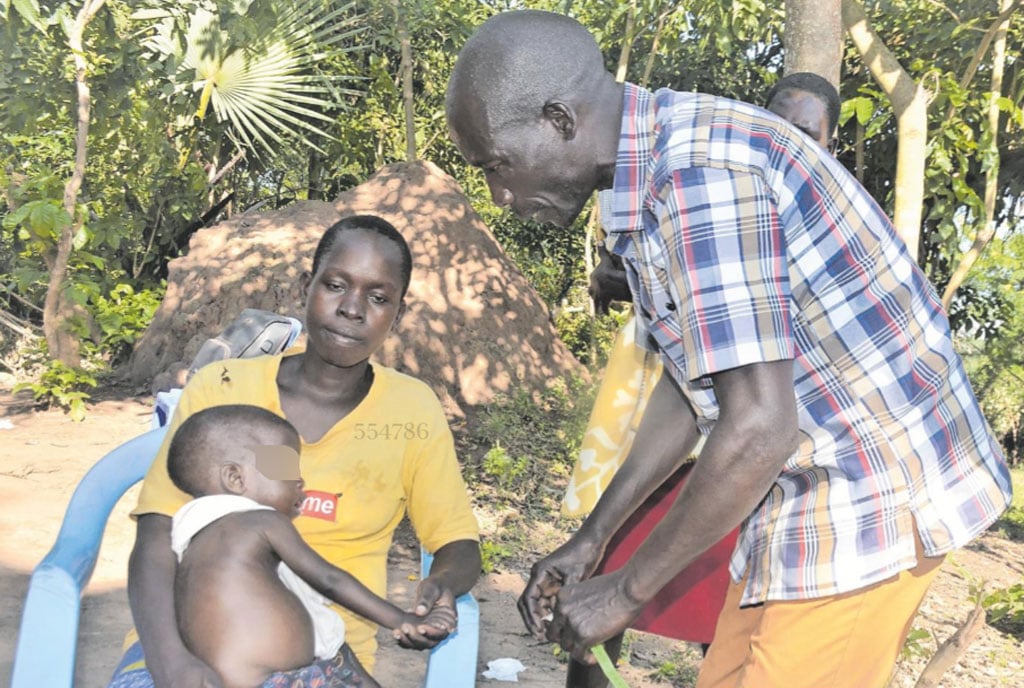
Mrs Faith Wanjala stayed indoors when the protest in Kenya got violent on June 25, 2024. Photo/Courtesy
Protests against the Finance Bill 2024 saw part of Kenya's parliament go up in flames on June 25.
Unprecedented events followed as Kenyans, mainly the youth, stormed the streets voicing their opposition to tax rises amidst economic hardships in a government headed by a president who came to power promising better lives for the poor.
President William Ruto withdrew the bill on June 26 saying "I concede" and called for dialogue with the youth.
On Tuesday, a day before the president's speech in which he declined to sign the bill into law, the youth were on the streets in about 35 counties out of the 47 in Kenya. They breached parliament then burnt a section of City Hall that houses the Governor of Nairobi and part of Uganda House among others.
The protesters held olive tree branches, a symbol of peace but the events that spiraled into chaos lead to the death of 22 people according to Kenya National Commission on Human Rights.
Monitor revisits scenes at the protest by speaking to Ugandans living and operating in Kenya for highlights of how the protests affected them.

Mr Edward Jjemba's boutique was vandalised by protesters in Kenya on June 25, 2024. Photo/Courtesy
Mr Edward Jjemba, a businessman operating a boutique in Rongai, Kenya, says the scale of the demonstrations took him by surprise since he considered Kenya, and especially Nairobi where he is based, much safer for him to work and thrive.
But he is counting financial losses since his wooden container was burnt and property looted.
“I am sincerely in shock. I am not feeling safe right now. I left my country [Uganda] to come to a peaceful, slightly well-off country to work. The last thing I needed was the demonstration. Protestors burnt my wooden container which I used as my boutique shop, and looted property in it. I must start from zero,” Mr Jjemba, said.
In a televised statement to Kenya yesterday, President Ruto said the protests that began peacefully had been "hijacked by dangerous people."
The police that had been deployed but the protesters overpowered them leading to firing of live bullets and teargas canisters were thrown to disperse them.
Amidst the chaos, some traders lost their property and leaders were beaten up especially in counties where leaders voted "yes" for the bill to be passed into law.
Mrs Faith Wanjala is married in Western Kenya’s Bungoma County where most leaders in their region voted yes to the finance bill, making protests in their area innevitable.
“With my hometown, Bungoma, the fact that we supported the ruling government makes almost all our leaders pro-government. Thank God, the Gen Z are not after parties or whatsoever, they are after the realities on the ground that come with over taxation. So last week a few of them showed up for protests and some of our leaders sent goons to beat them up for showing up in the streets,” Mrs Wanjala said.
Mrs Wanjala saw stayed indoors when the protest got violent. She watched history unfold on live television broadcasts.
This was possible because the media in Kenya joined hands to share live feeds such that Citizen TV could broadcast live events showing on KTN. The collaboration enabled widespread coverage of the event both on media stream and social media.
“Some of the protest victims were admitted in hospitals and this provoked more people to come out yesterday just to confirm to the leaders that the people are greater than their interests. Yesterday, the streets of Bungoma were full of young protestors and this really communicated a lot on how tired Kenyans are of the policies. I stayed indoors and followed everything online and on TV though,” Ms Wanjala said.
Some Ugandans living in Nairobi want a representative who can rescue them in times of need.
Mr Edward Jjemba told Monitor that Nairobi has not had a key Ugandan representative since the former ambassador died.
“Most of the time, we feel less represented. Last week, there was a Ugandan stabbed in the stomach in Kayole, [a Nairobi suburb], and the government did not issue any statement! We also have some Ugandans arrested and have no proper representation from Ugandan government. I call on the government to start being concerned,” Mr Jjemba said.

Fire at the Uganda House in Nairobi, Kenya on June 25, 2024. PHOTO/NMG
About Fire at Uganda House
In the heat of the protests in Nairobi yesterday, Uganda House, a Commercial building located along Kenyatta Avenue in the Central Business District was burnt. The building houses part of the Ugandan consular to Kenya. Several agencies, advisory services and other businesses was set on fire and partially burnt in the June 25th "#Occupy Parliament," "#RutoMustGo" protests in Nairobi.
Government through the Ministry of Foreign Affairs issued a statement on June 26 condemning actions of violence during the protests, causing destruction of property and loss of lives.
The newly refurbished 6-floor Uganda House on Kenyatta Avenue was slated for reopening this Friday June 28. After the renovations, the building was only occupied by commercial tenants on the ground floor.
According to the Ministry of Foreign affairs Permanent Secretary Vincent Bagiire, despite the extensive damage to the property, no reported fatalities or serious injuries have been reported.
“In the wake of protests in Kenya, on June 25, 2024, the protestors abandoned the principle of peaceful demonstrations and took the path of destruction of properties wherein the newly refurbished Uganda House - a Commercial Building located on Kenyatta Avenue in the Nairobi Central Business District was vandalized and set ablaze,” Mr Bagiire said.
He added in the statement that none of the Diplomatic or Consular staff were in the building at the time the fire broke out.
“While there is extensive damage to the property, we are grateful that there are no reported fatalities or serious injuries that have been identified so far. It is also important to note that none of the Diplomatic or Consular staff were in the building at the time the fire broke out,” Bagiire said.
He added that, “The Government of the Republic of Uganda would like to categorially state that our relations with the Government and indeed the people of the Republic of Kenya remain solid. We support peaceful demonstrations as a democratic right but we condemn in the strongest terms, violence that leads to destruction of property and loss of lives.”
The countrywide demonstrations were in protest of the recent approval of a new Finance bill by the Kenyan Parliament that the president declined to sign into law on June 26 in a widely published speech to Kenyans.

